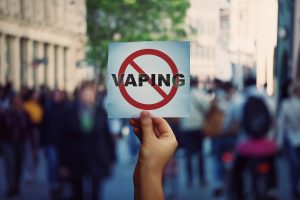A comprehensive ban on vaping has come into force in the Maldives.
The import of vaping devices and related products became illegal on November 15. The use, possession, manufacture, sale, advertising, and free distribution of e-cigarettes or vapes were prohibited with effect on Sunday, December 15.
Together with steep hikes on tobacco tariffs, the ban constitutes the harshest measures against smoking in recent Maldives history. Individuals caught vaping could be fined $325. The import of vapes carries a heftier fine of $3,240 and sales could be fined $1,300 with an additional $650 for each device sold.
The ban was imposed because “the people kept reiterating the need to save the youth from this,” President Dr. Mohamed Muizzu said on Sunday.
But public opinion has been divided. Maldivians on social media — one in four of whom is thought to be a smoker — have expressed both strong support and vehement opposition.
Muizzu’s announcement of the ban in October came after lobbying from health and sports associations amid growing concern over vaping in schools.
“Statistics show that 84 percent of people who die in the Maldives pass away from a non-communicable disease. Tobacco and types of tobacco are among the biggest risk factors for non-communicable diseases,” the Maldives NCD Alliance, a group of NGOs including the Cancer Society, stressed in a statement in September, raising the alarm over a sharp spike in the use of e-cigarettes in recent years, and urging the authorities to take “swift measures” toward a complete ban.
Multiple studies have shown that nicotine and other chemicals in vapes increase the risk of cancer, heart disease, stroke, and type-2 diabetes, the statement added. More than 60 percent of young vape users start smoking before the age of 18, according to research by the U.S. Center for Disease Control.
Vaping has been banned in 34 countries, including India and Thailand, the NCD Alliance noted.
The Doctors Association, Nurses Association and various sports associations backed the call for a ban. The appeals grew louder as parents, outraged by the discovery of a box full of vapes in a Malé school, petitioned the government for urgent action.
The easy availability, convenience, and portability of odorless vapes — compared to the more conspicuous act of smoking — were flagged as key reasons that enable their use in schools and heighten the danger of nicotine addiction among children.
In October, as the government proposed changes to the import-export and tobacco control laws, vape shops in Malé shut down for a strike and business owners protested outside Parliament. The irate shop owners called for regulation instead of criminalization.
Skeptics of the policy criticized the short notice for enforcement and accused the government of seeking to benefit tobacco sellers. Those who took up vaping to quit smoking would be forced back to cigarettes, they contended.
The global e-cigarette industry argues that “vapes pose significantly lower health risks than tobacco and help reduce its harms, while flavors are key in encouraging smokers to switch — a position shared by some tobacco control advocates,” Reuters reported this week.
But doctors have contested the use of vapes to quit smoking, citing the lack of evidence to support its “effectiveness and safety.”
The government-sponsored legislation approved by Parliament also targeted cigarette smoking by both tightening tobacco control rules and substantially raising import duties on tobacco products. When the hiked tariffs came into force on November 1, prices doubled from $6.5 to $13 for a pack of cigarettes.
On December 5, Health Minister Abdulla Nazim announced that tobacco cessation services will be covered under the national health insurance scheme. “By offering nicotine patches and gum through Aasandha, we are making it easier for those who want to quit to access the help they need,” he said.
The government’s “master plan on tobacco cessation” also includes setting up cessation clinics on all inhabited islands.
The World Health Organization (WHO) congratulated the Maldives on the new policies, welcoming the vaping ban as “an important initiative to arrest the worrying trend of increase in vaping, especially among young adolescents.”
According to the WHO, rates of e-cigarette use by children and adolescents exceed adult use in many countries.
“Further, to date, the commercialization (sale, importation, distribution or manufacture) of e-cigarettes as consumer products has not been proven to have had a net benefit for public health. Instead, alarming evidence on their adverse population health effects is mounting,” the United Nations agency observed, advising “strong decisive action” primarily to protect children.
In the Maldives, the Education Ministry confiscated “thousands of vape devices” from schools over the past year, Homeland Security Minister Ali Ihusan revealed at a press briefing in October. Addressing criticism of the ban, he highlighted the seizure of vape cartridges or pods infused with cannabis in police drug operations, decrying the recruitment of minors in the drug trade.
Ihusan confirmed that the vape ban will apply to tourists.
“From November 15, if anyone enters the Maldives and attempts to bring vape devices, we will intercept them at the border,” he told the press.
“Other governments may decide to offer tourists special status, similar to the way alcohol is allowed in resorts. However, we have no intention of doing so at this time.”

































